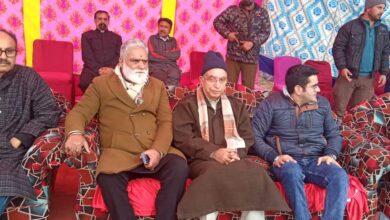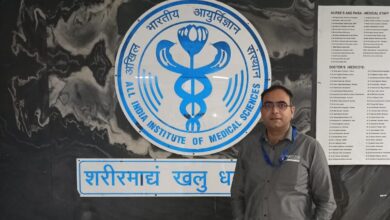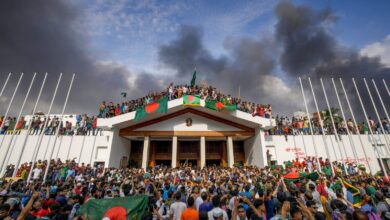‘Mandali’, the ancient tradition of Kashmiri group singing, organised by Vemedh Rangmanch in Jammu
The ‘Mandali’ programme was sponsored by Ministry of Culture, Government of India (BTI Section) under Training in Traditional Folk Art, approved under the scheme of Preservation and Development of Cultural Heritage of Himalayas.
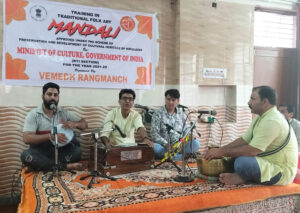 Jammu, April 27, 2023:Vemedh Rangmanch the prominent cultural and theatre group today organised, ‘Mandali’, the ancient tradition of Kashmiri group singing, at Sanjeevni Sharda Kendra, Jammu, as part of its ongoing programmes for the revival of traditional and ancient Kashmiri Pandit folklores, Bhajans, art, culture and languages in JKUT and elsewhere.
Jammu, April 27, 2023:Vemedh Rangmanch the prominent cultural and theatre group today organised, ‘Mandali’, the ancient tradition of Kashmiri group singing, at Sanjeevni Sharda Kendra, Jammu, as part of its ongoing programmes for the revival of traditional and ancient Kashmiri Pandit folklores, Bhajans, art, culture and languages in JKUT and elsewhere.
The ‘Mandali’ programme was sponsored by Ministry of Culture, Government of India (BTI Section) under Training in Traditional Folk Art, approved under the scheme of Preservation and Development of Cultural Heritage of Himalayas.
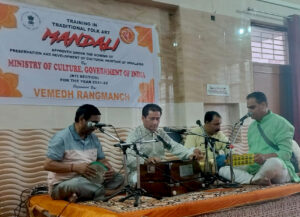 Renowned Kashmiri author and an expert of Kashmiri Pandit literature Dr Agnishkhar was the chief guest on the occasion while prominent spiritual guru Swami Kumar Ji was the Guest of Honour.
Renowned Kashmiri author and an expert of Kashmiri Pandit literature Dr Agnishkhar was the chief guest on the occasion while prominent spiritual guru Swami Kumar Ji was the Guest of Honour.
The ‘Mandali’ (Kashmiri Group Singing) was performed by prominent performers of the community Shanti Lal Sidh, BL Bhat Sharnagath, Rajesh Khar and Dr Ramesh Nirash.
The prominent people who were honoured by Vemedh for their contribution towards Kashmiri Pandit art, culture and languages by presenting mementoes, shawls and bouquets through Dr Agnishekhar and Swami Kumar Ji, include famous poet PN Shad, social activist Ramesh Aryan, and four other performer groups.
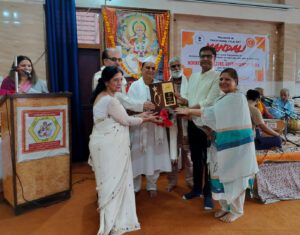 Dr Agnishekhar spoke at length about the rich cultural traditions of Kashmiri Pandits and the ancient forms of art, culture and languages and gave a detailed account of rich ancient art forms of Kashmir while Swami Kumar Ji blessed the gathering by his spiritual discourse.
Dr Agnishekhar spoke at length about the rich cultural traditions of Kashmiri Pandits and the ancient forms of art, culture and languages and gave a detailed account of rich ancient art forms of Kashmir while Swami Kumar Ji blessed the gathering by his spiritual discourse.
Dr Agnishekhar appreciated the endeavours of Vemedh particularly its president Rohit Bhat for always taking the lead to propagate the revival of age-old Kashmiri rituals and the legacy left behind by the ancestors adding such steps would go a long way to revive the lost rituals and culture of ancient Kashmir.
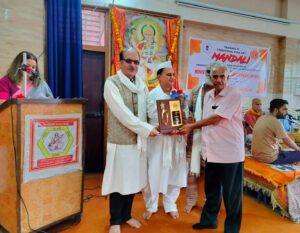 AK Naaz spoke on behalf of PN Shad, who could not attend the programme personally, on the occasion and dealt at length about the importance of preserving the rich cultural traditions and rituals of the community so that they can be passed on to the next generation. He also received the award on behalf of PN Shad.
AK Naaz spoke on behalf of PN Shad, who could not attend the programme personally, on the occasion and dealt at length about the importance of preserving the rich cultural traditions and rituals of the community so that they can be passed on to the next generation. He also received the award on behalf of PN Shad.
Senior Kashmiri Pandit leader MK Yogi was also presented on the occasion and appreciated the efforts of Vemedh. Other prominent personalities who attended the function include Dr Kshema Koul and Promila Aryan Ramesh.
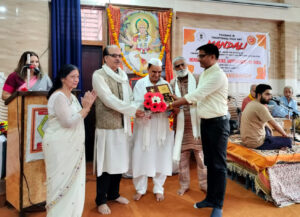 Earlier the ‘Mandali’ programme started with the traditional lighting of the lamp and welcome of the Chief Guest and Guest of Honour by Bharati Kaul and King C Bharati by presenting bouquets and shawls to them.
Earlier the ‘Mandali’ programme started with the traditional lighting of the lamp and welcome of the Chief Guest and Guest of Honour by Bharati Kaul and King C Bharati by presenting bouquets and shawls to them.
Bharati Kaul who has been conducting popular shows on Kashmiri pandit, culture, traditions, literature and other health related programmes read the welcome address while senior journalist and prominent social and theatre activist King C Bharati presented vote of thanks.
The programme was hosted by prominent anchor and actor Kusum Tickoo.
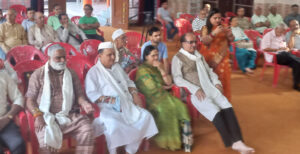
Mandali: The Ancient Tradition of Group Singing in Kashmir.
Music has been a part of Kashmir’s social life since ancient times. During every festivity, whether religious or semi religious or seasonal (sowing, harvesting spring, and new snowfall), the main item of celebration has been music; vocal and instrumental. The Nilamata Purana makes mention of professional singers and dancers active in ancient Kashmir. The Nilamata Purana also makes mention of Vadya, Vaditra and Vadya Bhanda as the category of key musical instruments. If one reads Vishnudharmottara Purana, one finds mention of Ghana (cymbal), Vitata (percussion), Tata (stringed instruments) and Susira (wind instruments). So musical instruments of ancient Kashmir are altogether different from what we see presently. The Harmonium, Tabla, Sitar, Banjo, Sarangi, Rabab and some more musical instruments in use currently have nothing to do with ancient musical tradition of Kashmir that had Venu, Veena, Pataha, Shankha, Damru, Muraja, Dundhubi and other musical instruments. Even Tumbaknaar is not the ancient Kashmiri musical instrument. The Santoor may have been the ancient musical instrument of Kashmir as we find mention of Shat Tantri Veena (hundred stringed percussion instrument) in ancient scriptures like Taittiriya Samhita although the Nilamata Purana is silent about it.
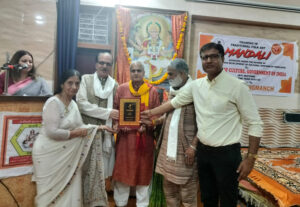 The Leela singing by a group of singers/musicians popularly known as Leela Mandali is very old tradition of Kashmir. It finds mention in the Nilamata Purana, Kathasaritsagar and some more tex’ts apart from works of Biilhana and Kshemendra. These texts hint at the existence of ‘Sangeet Mandala’ apart from Nritya Mandapa’ in the ancient temples of Kashmir. These books also inform about the presence of Devdasis in some temples of Kashmir. The practice of sacred devotional singing finds mention in Acharya Abhinavgupta’s Tantraloka. It finds mention in Mahabharata, Vedas and many other ancient scriptures. The style, instruments, and lyrics may have changed drastically but the purpose and occasion remain unchanged.
The Leela singing by a group of singers/musicians popularly known as Leela Mandali is very old tradition of Kashmir. It finds mention in the Nilamata Purana, Kathasaritsagar and some more tex’ts apart from works of Biilhana and Kshemendra. These texts hint at the existence of ‘Sangeet Mandala’ apart from Nritya Mandapa’ in the ancient temples of Kashmir. These books also inform about the presence of Devdasis in some temples of Kashmir. The practice of sacred devotional singing finds mention in Acharya Abhinavgupta’s Tantraloka. It finds mention in Mahabharata, Vedas and many other ancient scriptures. The style, instruments, and lyrics may have changed drastically but the purpose and occasion remain unchanged.
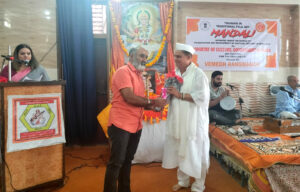
Group singing in temples or shrines during social or religious festivities has been a part of the civilizational ethos of Kashmiris. We come across many references in ancient texts and religious scriptures about group or Mandali singers performing on festivities like Sri Krishna’s birth day, Shivratri celebrations, spring festivals, marriages and other socio- religious events.
Coming to Mandali singing, we find this practice in vogue in temples, shrines and homes in ancient, mediaeval and modern Kashmiri society. Every temple or shrine in Kashmir had musical instruments. Professional or amateur singers would perform at these places on special occasions. These musical groups would also perform in houses carrying their own instruments. The ancient instruments were replaced by Chimta, Matka or Gaagar, Khasoo, Thaal, Harmonium, Tumbaknaar, Banjo and many more. Some temples or shrines in Kashmir had a regular night long Mandali singing sessions which extended till morning hours. There was a practice of Mandali singing at Hari Parbat temple on every Saturday. It was attended by people from all parts of the city. Similar practice was in vogue at Pokhribal temple and even inside Mohalla temples in Kashmir valley. Many families also had regular Mandali singing sessions attended by their friends and relations. Leelas of Krishen Joo Razdan, Parmanand and Lal Vaakh were quite popular in these sessions. The Mandali singing would begin with Vaakhs of saint poetess Lal Ded. This Mandali tradition had a great role in civilizational continuity and preservation of heritage amongst Kashmiri Pandits.
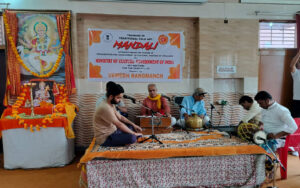 The Mandali singing tradition that had evolved over centuries in the Kashmir valley is fast disappearing after the displacement of Kashmiri Pandits from their original homes and hearths. Serious efforts are needed at all levels to preserve and protect this rich tradition. We need to remember and know how effectively the Bengali society has fought the onslaughts of modern living, urban migration and other issues to preserve its rich heritage of Baul singing. Every musical tradition in the world is nothing but a part of the Intangible Cultural Heritage of Humanity. (Courtesy: Avtar Mota)
The Mandali singing tradition that had evolved over centuries in the Kashmir valley is fast disappearing after the displacement of Kashmiri Pandits from their original homes and hearths. Serious efforts are needed at all levels to preserve and protect this rich tradition. We need to remember and know how effectively the Bengali society has fought the onslaughts of modern living, urban migration and other issues to preserve its rich heritage of Baul singing. Every musical tradition in the world is nothing but a part of the Intangible Cultural Heritage of Humanity. (Courtesy: Avtar Mota)


